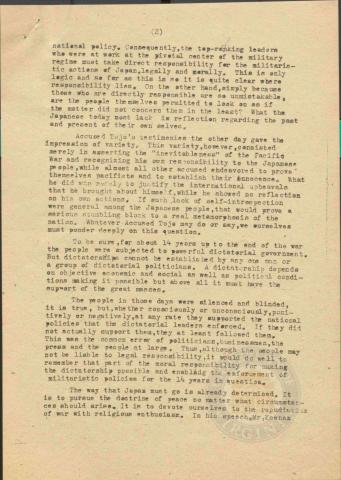
Page 2
| Parent | Keenan Opening Statement printed in Tokyo News |
|---|---|
| Date | 12 February 1948 |
| Language | EN; JA |
| Collection | Tavenner Papers & IMTFE Official Records |
| Box | Box 6 |
| Folder | General Reports and Memoranda from February 1948 |
| Repository | University of Virginia Law Library |
(2)
national policy. Consequently, the top-ranking leaders who were at work at the pivotal center of the military regime must take direct responsibility for the militaris¬tic actions of Japan, legally and morally. This is only logic and so far as this is so it is quite clear where responsibility lies. On the other hand, simply because those who are directly responsible are so unmistakable are the people themselves permitted to look on as if the matter did not concern them in the least? What the Japanese today most lack is reflection regarding the past and present of their own selves.
Accused Tojo's testimonies the other day gave the impression of variety. This variety, however, consisted merely in asserting the "inevitableness" of the Pacific War and recognizing his own responsibility to the Japanese people, while almost all other accused endeavored to prove themselves pacifists and to establish their innocence. What he did was merely to justify the international upheavals that he brought about himself while he showed no reflection on his own actions. If such lack of self-introspection were general among the Japanese people, that would prove a serious stumbling block to a real metamorphosis of the nation. Whatever Accused Tojo may do or say,we ourselves must ponder deeply on this question.,
To be sure, for about 14 years up to the end of the war the people were subjected to powerful dictatorial government. But dictatorships cannot be established by any one man or a group of dictatorial politicians. A dictatorship depends on objective economic and social as well as politico, condi¬tions making it possible but above all it must have the support of the great masses.
The people in those days were silenced and blinded, it is true, but, whether consciously or unconsciously, positively or negatively, t any rate they supported the national policies that the dictatorial leaders enforced. If they did not actually support them, they at least followed them. This was the common error of politicians, businessmen, the press and the people at large. Thus, although the people may not be liable to legal responsibility, it would do well to remember that part of the moral responsibility for making the dictatorship possible and enabling the enforcement of militaristic policies for the 14 years in question.
The way that Japan must go is already determined. It is to pursue the doctrine of peace no matter what circumstan¬ces should arise. It is to devote ourselves to the repudiation of war with religious enthusiasm. In his speech, Mr. Keenan
